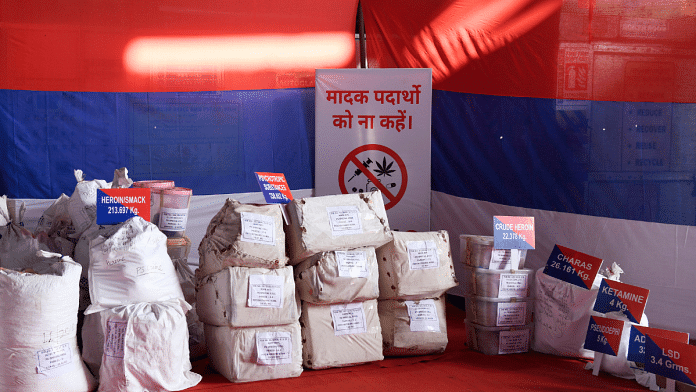New Delhi: Nearly six years after launching its anti-substance abuse initiative, the Narendra Modi government is planning a nationwide survey to assess the extent of drug abuse, evaluate the impact of its schemes, and—in a first—gather district-wise data on estimated number of drug users, ThePrint has learnt.
The Ministry of Social Justice and Empowerment is in talks with the National Drug Dependence Treatment Centre (NDDTC) operated by All India Institute of Medical Sciences’ (AIIMS) to conduct the survey.
AIIMS conducted the first such survey in 2018.
It is learnt that a team of doctors from AIIMS recently presented before the ministry a detailed plan for the study.
“The first survey gave us an idea about the magnitude of the problem of substance abuse in India and its prevalence in different age and gender groups, and types of substances which are used the most. The scale of the second survey will be almost four times the previous one,” said a senior ministry official, who did not wish to be named.
Adding, “For the first time, we will be collecting district-wise data of people involved in drug use. The plan is to start the survey within the next two to three months.”
The first survey report (Magnitude of Substance Abuse in India 2019) formed the basis for the government’s efforts to address drug dependence and reduce the demand for drugs in the country.
It said nearly 16 crore people consumed alcohol in India; more than 5.7 crore were affected by harmful alcohol use and needed help. It also found that 3.1 crore people used cannabis products, 2.26 crore used opioids, of which nearly 77 lakh needed help for related issues.
The ministry is the nodal agency for implementation of Centre’s National Action Plan for Drug Demand Reduction (NAPDDR), under which the Nasha Mukt Bharat Abhiyan (NMBA) was launched in 2020.
Initially, the NMBA was implemented in 272 most vulnerable districts to create awareness about substance use with focus on higher educational institutions, university campuses and schools, on counselling and treatment facilities in hospitals and rehabilitation centres etc. The scheme was extended to all districts in 2023.
The second survey will focus on the impact of the government’s plan to reduce drug demand and provide adequate treatment facilities.
Through the survey, the official said, efforts would be made to put in place a mechanism to get a quick, annual snapshot of drug use patterns in the country, especially in key locations. “It will help in monitoring the trend and plan the policy and strategy to tackle the problem accordingly,” said a senior official.
ThePrint reached the Ministry of Social Justice and Empowerment for comment but had not received a response by the time of publication.
Rajesh Kumar, Executive Director of Society for Promotion of Youth and Masses, a Delhi-based NGO working to rehabilitate drug addicts, said, “It is a good move to assess the extent of substance abuse and impact of policies in curbing the menace. In the past few years, new drugs, which are a lot more harmful, are available. There is a need to identify the number of people who are dependent on such drugs.”
Kumar said to tackle the problem more effectively, it was important to know the extent of drug use in each district.
The ministry official quoted earlier said that the first survey helped understand the extent of substance abuse in each state, which in turn, was helpful for the central government in terms of resource allocation. “But states don’t have data to plan their strategy. The district-wise survey will now help states plan focused interventions based on the number of affected people, type of substance used by people etc.”
The ministry official said that apart from surveys at the district level, the ministry will also conduct surveys of some vulnerable groups or communities to collect data about the prevalence of drug use. This could include select groups and communities including students, LGBTQI+ community, those involved in long-distance transportation and sex workers. The list of “focused groups” is yet to be finalised.
(Edited by Tikli Basu)






